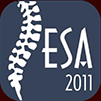Subject Area
Degenerative, Lumbosacral spine
Article Type
Original Study
Abstract
Background Data: The optimal treatment for patients with Spondylolisthesis has been the subject of many recent studies which provide some of the best evidence for lumbar spinal fusion. Purpose: Compare the clinical and radiological outcome of treating low grade lumbar spondylolisthesis patients with PLIF augmented with PSF versus those treated with PLIF augmented with Percutaneous PSF. Study Design: This is a prospective comparative clinical case study.Patients and Methods: Seventeen patients with low grade spondylolisthesis who underwent instrumented fixation were retrospectively analyzed from the period of 2011 to 2012. A PLIF and PSF (Group A) was performed in 9 patients, andPLIF and percutaneous PSF (Group B) was performed in 8 patients. Data were collected preoperatively and at 6 months after surgery. A comparative analysis was made between the 2 groups using visual analog pain scale (VAS) before andafter surgery, and functional disability was assessed using the Oswestry Disability Index (ODI), by which low back pain, disability were assisted using a questionnaire and radiological (dynamic plain radiographs and CT scans) measures.Results: Follow-up duration was 6 months. The mean preoperative scores on the VAS for low-back pain in Groups A and B were 55 and 54, respectively, decreasing to 43 and 39, respectively, at 6 months after surgery (P=0.003). Themean preoperative scores on the VAS for leg pain in Groups A and B were 65 and 61, respectively, decreasing at 6 months after surgery to 43 and 40, respectively (P=0.031), The fusion rates in Groups A and B were obtained in all 17 cases withvariable rates of fusion in groups A 88.9% and in group B 75% at 6 months after surgery (P=0.008), There was no significant difference in terms of the complication rate between Group A (4.5%) and B (3.9%) (P=0.781).Conclusion: Patients with PLIF and PSF results were much better than those with PLIF and percutaneous PSF. The postoperative back pain was much less in the percutaneous group and relatively longer time for fusion. These results seem to favor PLIF with SF rather than PLIF with percutaneous PSF in the treatment of low grade spondylolisthesis. (2013ESJ042)
Keywords
percutaneous, Pedicle Screws fixation, posterior lumbar interbody fusion, Spondylolisthesis, back pain
How to Cite This Article
Elkhatib,, Esam
(2013)
"Posterior Lumbar Interbody Fusion (PLIF) augmented with Pedicle Screw Fixation Versus PLIF augmented with Percutaneous Pedicle Screw Fixation in Low Grade Lumbar Spondylolisthesis,"
Advanced Spine Journal: Vol. 6
:
Iss.
1
, Article 2.
Available at: https://doi.org/10.21608/esj.2013.3814




















